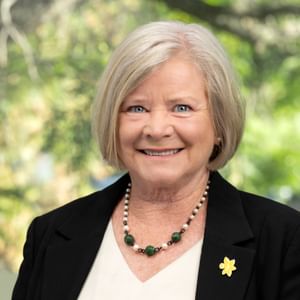Board of Directors
The Board of Directors oversees the business of Cancer Council SA. The Board’s key objectives are to:
- set the strategic directions for Cancer Council SA and effective oversight of management
- optimise Cancer Council SA’s performance and stakeholder value within a framework of appropriate risk assessment and management
- recognise Cancer Council SA’s legal and other obligations to all legitimate stakeholders.
To achieve these objectives, the Board is committed to working towards best corporate governance practices. Corporate governance is concerned with the way that the Directors ensure that the organisation’s systems and processes are properly controlled and functioning effectively, and that management is complying with the Board’s policies and directives.
To assist the Board to meet their statutory and fiduciary obligations, it is supported by four board committees.
Nomination, Remuneration and Governance Committee
- Reviews and makes recommendations to the Board on the structure of remuneration packages and policies applicable to the Chief Executive, senior executives and staff. The Board utilises a company-wide process for determining remuneration. The services of an external remuneration consultant are used to conduct benchmarking.
- Reviews remuneration policy and compliance with approved policy.
- Monitors succession planning and development, company culture and implementation of and compliance with the Organisation Development Policy.
- Monitors and reviews the composition of the Board, recommends nominations to the Board, and manages the Director and Board performance evaluation process.
- Monitors the governance of the company in accordance with relevant legislation and best practice.
Audit, Finance and Risk Committee
The primary responsibility of the Committee is to assist the Board of Directors in fulfilling its responsibilities in relation to the identification of areas of significant business risks and the monitoring of:
- effective management of financial business risks
- reliable management reporting
- compliance with laws and regulations in respect to financial reporting
- maintenance of an effective and efficient audit
- related party transactions
- the protection of physical and financial assets.
Cancer Council SA operates within its risk policy.
Investment Committee
The role of the Investment Committee is to recommend investment policy, review the appointment and performance of investment portfolio managers, monitor compliance with investment policy and monitor risk control limits.
Cancer Council SA maintains a diversified investment portfolio in accordance with its Investment Policy. JBWere is our appointed portfolio managers.
Cancer Research Committee
The role of the Cancer Research Committee is to support the strategic research targets of Cancer Council SA by monitoring and assessing investments in cancer research and making recommendations to the Board on funding options.
Our Board
There is an expectation in the community that the Boards of organisations like Cancer Council SA will operate in a transparent manner using best practice standards for corporate governance.
Conflict of interest
The Board recognises that proactive management of actual conflicts of interest will significantly reduce legal risks for individual Board Members and the Board as a whole. Inadequate management of perceived conflicts of interest may damage the reputation and effectiveness of individual Board Members, the Board and Cancer Council SA.
Therefore the Board has implemented a systematic and transparent process for dealing appropriately with each case. The Board recognises that it is not possible to eliminate every possible conflict of interest that may arise and have effect on Board and Board committee members.
Risk management
Cancer Council SA’s Risk Management philosophy is as much about grasping opportunities and creating successes as it is about minimising losses. Risk is therefore as much about something good not happening as something bad happening. The goal is not to eliminate all risk but rather to ensure that risk is maintained at an acceptable level in a cost-effective manner.
Risk management requires:
- forward thinking and a pro-active approach to management
- achieving a balance between the costs of managing risk and the anticipated benefits
- using a formal systematic approach of identifying, analysing, evaluating, treating, monitoring and communicating risks associated with any activity, function or process.
This will facilitate decision making, ensure good governance through the performance and accountability of all employees and will also assist to ensure resources are properly allocated to manage those risks.
Cancer Council SA is committed to the management of all types of risks within its operations to assist in the achievement of its goals, programs, targets and its vision as outlined in the Strategic Management Plan.
Cancer Council SA will maintain risk management practices that provide it with a consistent, systematic view of the risk it faces in the course of its activities. These practices will be consistent with the guidelines and principles of risk management as set out in the Australian Risk Management Standard ISO 31000:2009 and business best practice.
Cancer Council SA’s Risk Management Framework and Methodology supports this Policy and will provide a formal, systematic approach to risk management which is consistent with the guidelines and principles of the Risk Management Standard.
The role of the Board
The Board is responsible for the overall corporate governance of Cancer Council SA as follows:
- Oversight of Cancer Council SA including its control and accountability systems.
- Setting a clear strategic direction by recognising and publishing the respective roles and responsibilities of Board and management.
- Structuring the Board to add value by having an effective composition, size and commitment to adequately discharge its responsibilities and duties.
- Promoting ethical and responsible decision-making and leading by example.
- Safeguarding the integrity of financial reporting by having a structure to independently verify Cancer Council SA’s processes.
- Making timely and balanced disclosure of all material matters concerning Cancer Council SA.
- Ensuring a sound system of risk management and internal controls are in place.
- Respecting the rights of stakeholders by ensuring we use funds in the best possible way to achieve our mission.
- Recognising the legitimate interests of stakeholders by ensuring we are aware of stakeholder’s views about services we offer.
- Respecting and valuing the contributions of our volunteers by acknowledging the vital role they play in meeting our objectives.
- Encouraging enhanced performance by fairly reviewing and actively encouraging enhanced Board and Chief Executive effectiveness.
Learn more about our Board of Directors here.
Delegation of authority to management
The Board delegates authority to management in relation to various operational functions. These authorities include expenditure, disciplinary action, recruitment of new staff other than the Chief Executive, termination of staff other than the Chief Executive, release of intellectual property, entering commercial agreements, application to funding sources, development and publication of educational and promotional materials, and making public comment on Cancer Council SA’s behalf.
The following rules take precedence over specific delegations:
- There must be a budget for the expenditure.
- Items not in the budget and that are considered material must be approved by the Board, or it must be within the overall budget limit and be approved by either the Chief Executive or the General Manager Finance and Governance.
- An employee can never approve his or her own expenditure item. Items must be approved by the executive deemed to be on the next delegative level above the relevant executive.
Directors’ performance
It is important that individual Directors devote the necessary time to the Board. To this end, there is a review of the time required from a Director, and whether they are meeting this. A Director should inform the Chairperson before accepting any new Board appointments.
The size and composition of the Board are also reviewed, to ensure that these are conducive to achieving the best possible performance from Directors with the skills necessary for good stewardship of Cancer Council SA.
It is the responsibility of the Chair to ensure Directors contribute appropriately, and they monitor this in an informal manner at each Board and Committee meeting. If there is a matter of improvement to be raised, this will be done on either an individual or group level, as appropriate. The Chair also reviews the effectiveness of meetings and makes recommendations as to areas of possible improvement for future meetings where appropriate.
Directors’ induction
Immediately upon appointment, a new Director has available an induction program designed to allow them to participate fully and productively in Board decision-making. The induction program covers Cancer Council SA’s structure and goals, financial, strategic, operational and risk management positions and the role and operation of the Board committees. The Board is responsible for reviewing the effectiveness of the Director induction program.
Directors’ continuing education
Directors are expected to undertake continuing education both as regards the normal discharge of their formal director duties as well as the ongoing developments within Cancer Council SA and its operating environment. Directors typically attend courses and seminars relevant to the effective discharge of their duties.
Ethical standards
Cancer Council SA acknowledges the need for Directors, executives and employees to observe the highest ethical standards of corporate behaviour when undertaking Cancer Council SA business.
Cancer Council SA has adopted a Code of Conduct which outlines the principles and standards with which all Directors are expected to comply. Those major principles and standards are:
- a Director must act honestly, in good faith and in the best interests of Cancer Council SA
- a Director has a duty to use due care and diligence in fulfilling the functions of office and exercising the powers attached to that office
- a Director must use the powers of office for a proper purpose, in the best interests of Cancer Council SA
- a Director must recognise that the primary responsibility is to the interests of all stakeholders of Cancer Council SA
- a Director must not make improper use of information acquired as a Director
- a Director must not take improper advantage of the position of Director
- a Director must not allow personal interests, or the interests of any associated person, to conflict with the interests of Cancer Council SA
- a Director has an obligation to be independent in judgement and actions and to take all reasonable steps to be satisfied as to the soundness of all decisions taken by the Board of Directors
- confidential information received by a Director in the course of the exercise of directorial duties remains the property of Cancer Council SA from which it was obtained, and it is improper to disclose it, or allow it to be disclosed, unless that disclosure has been authorised by Cancer Council SA, or the person from whom the information is provided, or is required by law
- a Director will not engage in conduct likely to bring discredit upon Cancer Council SA.
A Director has an obligation, always, to comply with the spirit, as well as the law and with the principles of this Code
Remuneration policy
Cancer Council SA uses a transparent approach to setting and reviewing employee remuneration based upon independent market-based information to support attracting and retaining the best people.
The way Cancer Council SA chooses to pay employees communicates its values which contributes to the culture, the type of people it attracts and the results they deliver. It is therefore important that a remuneration policy be developed with the organisation’s objectives in mind and that people are paid appropriately for the work that they perform.
The remuneration policy is based on the following principles:
- Employee remuneration is based upon the duties and responsibilities he/she is expected to perform.
- Those duties and responsibilities are assessed using an externally sourced method to establish an independently verifiable position grading.
- The position grading will provide a guide to the remuneration for the applicable position.
- Remuneration will be competitive with the external market in which Cancer Council SA operates and be cost effective.
- Employees are remunerated in a fair and equitable way.
- Application of this policy supports the performance planning and review process of nurturing employee commitment to the organisation.
Guidelines
Job classification
Job evaluation is an objective, transparent way of classifying a position but not the value or performance of the position holder. It is accepted best practice for employers to use a formal system for measuring or evaluating positions and to assign a grade. The system used at Cancer Council SA is provided by an external advisor which includes making assessments of comparative levels of responsibility of positions and their contributions to the organisation.
Application of remuneration ranges
Cancer Council SA bases its remuneration on the 25th percentile of general market positioning determined by the external advisor as appropriate for the sector taking into account the ability to salary package and Fringe Benefits Tax exemption.
Salary decisions on appointment will be made by the General Manager and will fall within the minimum and maximum of the remuneration range. Any appointments made outside the remuneration range must have authorisation from the Chief Executive.
Decisions on remuneration for a position will be made using the points awarded through the job classification process conducted by the General Manager People, Safety and Culture and the recruiting manager.
Our regulatory environment
The Cancer Council South Australia (ABN 29 053 873 822), a company limited by Guarantee, is trustee of the Cancer Council South Australia Trust which trades as Cancer Council SA (ABN 29 053 873 822). Further information regarding the legal structure of the organisation is contained in note 1 to the financial report appended in our latest annual report.
The Cancer Council South Australia (ABN 29 053 873 822) is a Charity registered with the Australian Charity and Not-For-Profit Commission (ACNC).
Cancer Council SA holds a Charitable Purpose License issued under the South Australian Legislation – Collection for Charitable Purpose Act 1939, by Consumer and Business Service.
For a copy of the Cancer Council SA Collection for Charitable Purposes Act Code of Practice – Disclosure by Collectors Information Sheet click here.
The Cancer Council South Australia Trust which trades as Cancer Council SA (ABN 29 053 873 822) is a Health Promotion Charity and is registered as a Deductible Gift Recipient with the Australian Taxation Office.
Cancer Council SA meets or exceeds the regulatory requirements of ACNC. Information about ACNC can be obtained at www.acnc.gov.au.
Legislation that has a material impact on the operation of Cancer Council SA includes:
- Corporation Act 2001
- Income Tax Assessment Act 1997
- Fair Work Act 2009
- A New Tax System (Goods and Services Tax) Act 1999
- Privacy Act 1988
- Australian Charities and Not-for-Profit Commission Act 2012
- Liquor Licensing Act 1997
- Collection for Charitable Purpose Act 1939
- Work Health and Safety Act 2012.
Cancer Council SA ensures employees are aware of the legislative and regulatory requirements that may affect their area of work.
Cancer Council SA works with our legal advisors to ensure our knowledge of legislative and regulatory requirements remains current and seek specific advice where there is a material change to the regulatory environment.
Financial reporting
As a trusted and reputable charity, Cancer Council SA believes in making its financial reports available for the public.
The financial reports found in our annual report are Tier 2 general purpose financial reports which has been prepared in accordance with the Australian Accounting Standards Reduced Disclosure Requirements adopted by the Australian Accounting Standards Board and the Corporations Act 2001.
Our stakeholders
Cancer Council SA has a diverse range of individuals and organisations that have an interest in our operations and activities.
Our stakeholders include:
- the South Australian community
- people with cancer, their families, carers and friends
- our volunteers, fundraisers and donors
- our employees
- our suppliers
- the South Australian Government, its departments and authorities
- researchers and medical professionals
- the Australian Government.
Cancer Council SA provides general and specific communications as appropriate to our stakeholder groups.
The Annual Report and information presented on the Cancer Council SA website form the basis of the general communication.
Targeted communication pieces are prepared to provide information and support for people with cancer, their families and supporters.
Specific engagement through periodic and ad-hoc targeted communication pieces, presentations and face to face meetings support the general communications with our volunteers, fundraisers and donors.
Cancer Council SA has direct communication with the South Australian Government and its various departments and authorities involved in the regulation, administration, service and support of South Australians with cancer and their carers. Our dialogue with the Government also covers activities related to or having an impact on the incidence of cancer in the community.
Employee engagement is supported by our internal staff newsletter, quarterly all staff meetings as well as focus group research to monitor employee wellbeing in the workplace.
Our website contains specific information for researchers and medical professionals to assist them in their work with those impacted by cancer.
Surveys are used to obtain stakeholder feedback on Cancer Council SA’s operations and activities. These surveys play a vital role in the planning and development of future operations and interactions with our stakeholders.
Cancer Council SA uses social media to provide an avenue for both stakeholder information and engagement. Social media channels are monitored and updated with new and relevant information on an ongoing basis.
Code of conduct
Cancer Council SA prides itself in operating at or exceeding industry expectations across business practices in the healthcare industry, the fundraising industry and the broader charity sector.
Our staff and regular volunteers are asked to operate within a Code of Conduct. This Code of Conduct helps to maintain the best possible working environment and ensure we meet the needs of the community we serve.
Cancer Council SA is an organisational member of the Fundraising Institute of Australia (FIA) and aims to meet or exceed the Principles and Standards of Fundraising Practice for the industry.
Have we failed to meet your expectations?
If you feel that Cancer Council SA has in any way breached any principles, standards or code of conduct we would really like to hear from you. We have thousands of volunteer fundraisers collecting monies across the state at any one time.
It is important that feedback comes through to us so we can correct any activities that do not meet industry standards or your expectations. Cancer Council SA relies heavily on community fundraising activities, and we do our best to ensure these activities meet community expectations.
There are many ways to lodge a complaint regarding the activities of Cancer Council SA or any of our community supporters:
- By phone: Call us on 1300 65 65 85 to provide feedback including complaints.
- By email: All email complaints will be directed through to the appropriate person and we aim to respond to your issue as soon as possible. Often we need to contact members of the community which can take some time and so we aim to have a response to you within five working days. Email us at info@cancersa.org.au.
- In person: Please visit us at 202 Greenhill Road, Eastwood.
- By post: Please address mail to Chief Executive, Cancer Council SA, PO Box 929, Unley BC, South Australia 5061.
If you are not satisfied with any response you receive regarding our fundraising activities, then you can register your complaint with the Fundraising Institute of Australia through the FIA Complaints Process.
You also have the option to register any complaint within South Australia through the Office of Consumer and Business Services or through the Office of the Liquor and Gambling Commissioner here in South Australia.
Memberships of external organisations
We are proud to support our staff in sharing their knowledge and skills for the benefit of the broader South Australian community.
Cancer Council SA is committed to working towards our purpose of reducing the rate and impact of cancer for all South Australians.
As such the organisation and staff belong to a number of external organisations and professional associations to ensure that we operate in the most professional environment, maintain relationships with organisations that have similar goals and achieve the highest standards in our fields of expertise.
Cancer Council SA is an organisational member of:
- Fundraising Institute of Australia (FIA)
- International Cancer Information and Support Group (ICISG)
- Multinational Association of Supportive Care in Cancer (MASCC)
- Union for International Cancer Control (UICC)
Cancer Council SA staff are professional members of:
- Australian Institute of Company Director (AICD)
- Institute of Chartered Accountants of Australia (ICAA)
- Certified Practising Accountants (CPA)
- Fundraising Institute of Australia (FIA)
- Clinical Oncology Society of Australia (COSA)
- Cancer Nurses Society of Australia (CNSA)
- Psycho Oncology Research Group
- Australian Nurses Federation



